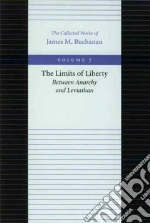The Limits of Liberty
Book (italiano):
<DIV>Published originally in 1975, <I>The Limits of Liberty</I> made James Buchanan’s name more widely known than ever before among political philosophers and theorists and established Buchanan, along with John Rawls and Robert Nozick, as one of the three new contractarians, standing on the shoulders of Hobbes, Locke, and Kant.<br><BR> While <I>The Limits of Liberty</I> is strongly related to Buchanan’s <I>Calculus of Consent</I> (Vol. 3 in Liberty Fund’s <I>Collected Works of James M. Buchanan</I>), it is logically prior to the <I>Calculus</I>, according to Hartmut Kliemt in the foreword, even though it was published later. As Kliemt states, ?[<I>The Limits of Liberty</I>] characterizes the status quo from the point where Paretian politics starts and at the same time describes conceivable processes of interindividual agreement that might lead from a natural equilibrium to a political one.” <br><BR> Buchanan frames the central idea most cogently in the opening of his preface: ?Precepts for living together are not going to be handed down from on high. Men must use their own intelligence in imposing order on chaos, intelligence not in scientific problem-solving but in the more difficult sense of finding and maintaining agreement among themselves. Anarchy is ideal for ideal men; passionate men must be reasonable. Like so many men have done before me, I examine the bases for a society of men and women who want to be free but who recognize the inherent limits that social interdependence places on them.” <br><BR> <B>James M. Buchanan</B> is an eminent economist who won the Alfred Nobel Memorial Prize in Economic Sciences in 1986 and one of the greatest scholars of liberty in the twentieth century. <br><BR> The entire series will include:<br><BR> <p class="textbasic"><a href="details.asp?displayID=1696">Volume 1</a>: <I>The Logical Foundations of Constitutional Liberty</i> <br><a href="details.asp?displayID=1725">Volume 2</a>: <I>Public Principles of Public Debt </i> <br><a href="details.asp?displayID=1593">Volume 3</a>: <I>The Calculus of Consent </i> <br><a href="details.asp?displayID=1724">Volume 4</a>: <I>Public Finance in Democratic Process</i> <br><a href="details.asp?displayID=1607">Volume 5</a>: <I>The Demand and Supply of Public Goods</i> <br><a href="details.asp?displayID=1602">Volume 6</a>: <I>Cost and Choice</i> <br><a href="details.asp?displayID=1693">Volume 7</a>: <I>The Limits of Liberty</i> <br><a href="details.asp?displayID=1610">Volume 8</a>: <I>Democracy in Deficit</i> <br><a href="details.asp?displayID=1722">Volume 9</a>: <I>The Power to Tax</i> <br><a href="details.asp?displayID=1731">Volume 10</a>: <I>The Reason of Rules</i> <br><a href="details.asp?displayID=1720">Volume 11</a>: <I>Politics by Principle, Not Interest</i> <br><a href="details.asp?displayID=1618">Volume 12</a>: <I>Economic Inquiry and Its Logic</i> <br><a href="details.asp?displayID=1719">Volume 13</a>: <I>Politics as Public Choice</i> <br><a href="details.asp?displayID=1606">Volume 14</a>: <I>Debt and Taxes</i> <br><a href="details.asp?displayID=1634">Volume 15</a>: <I>Externalities and Public Expenditure Theory</i> <br><a href="details.asp?displayID=1597">Volume 16</a>: <I>Choice, Contract, and Constitutions</i> <br><a href="details.asp?displayID=1701">Volume 17</a>: <I>Moral Science and Moral Order</i> <br><a href="details.asp?displayID=1637">Volume 18</a>: <I>Federalism, Liberty, and the Law</i> <br><a href="details.asp?displayID=1672">Volume 19</a>: <I>Ideas, Persons, and Events</i> <br><a href="details.asp?displayID=1676">Volume 20</a>: <I>Indexes</i> </p></div>
|
Quantity
|

|
|

